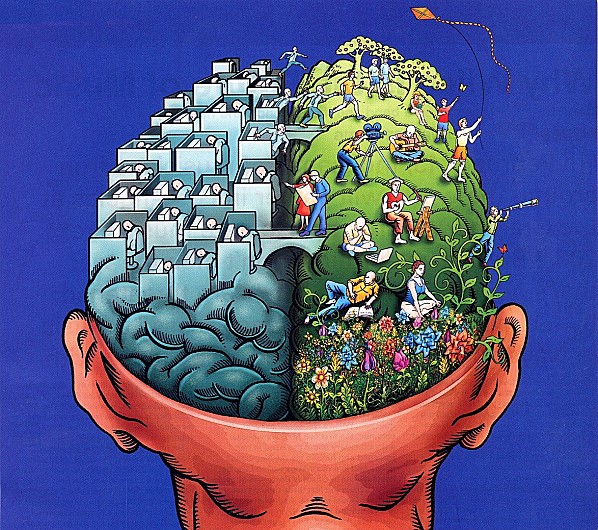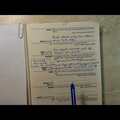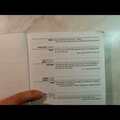Edward de Bono's story of the worms
INTERVIEWER
Usually we think in a straightforward, perhaps we could call it vertical way, using a certain amount of logic. Lateral thinking is a different way of thinking according to Dr de Bono, perhaps demonstrated well by one of his stories.
EDWARD de BONO
The story is of three worms who go for a walk and there's Mummy Worm, Daddy Worm, and Baby Worm... and they come to a mound of sand... and each worm goes through the mound of sand and when they come out the Baby Worm looks back and says Oh that's strange, there's only two holes. (pause) Now you can tell that to people and they sit around wondering and they say Well aren't worms hermaphrodites or maybe they went through the same holes ... and all sorts of things.
INTERVIEWER
That's easy...
EDWARD de BONO
The answer is... (laughs) David Brown has the answer... the answer is that Baby Worm couldn't count!
*** *** ***
Interview with Tony Buzan
This interview was broadcast on LBC (London Broadcasting Company) radio.
INTERVIEWER
A certain Professor Rosenweig tells us that the brain can take in ten new bits of information every second for an entire lifetime and still be not more than half full. Well that information is a little mindbending in itself. The abilities of the brain and what the job of the brain is, are discussed in a book called The Evolving Brain by Tony Buzan and Terence Dixon. Tony Buzan is Director of the Learning Methods Group and he told me whether our belief that the brain of a young child is more receptive than that of an adult, whether our belief that that is the case is true.
TONY BUZAN
Historically we... we tend to absorb more information when we're young... more new information and then because we've, so to speak, learned and graduated from school or college or whatever we've been studying, we tend to assume that we don't need to take in much more. What actually happens in terms of the brain's potential is that if the brain is used properly, we can continue to learn more and more and more the older we get.
INTERVIEWER
... and does it reach the stage though... does your brain reach the stage where it is more difficult because the brain is older, to absorb new information?
TONY BUZAN
Well that's what has been assumed... it can reach that stage if the brain hasn't been used... er... you know if you don't use it say for twenty years and by not using I mea... you don't learn any new languages, you don't read much, you don't stimulate it much, you don't ask many questions and you don't try to get many answers...
INTERVIEWER
You just use the information you have in order to live (unclear)
TONY BUZAN
Yeah... you kind of go on automatic, if you like. If you do that for twenty years and then you suddenly say to the brain, you know, Now work out these problems, learn this do that ... and so on and so forth, it goes into shock for a little while because it literally hasn't been used to it. But if you continue to stimulate it, it will start to get better. So the only situations in which brains normally get worse are really the kind of major disease or physical damage or simply non-use.
INTERVIEWER
What are the things that er the brain is responsible for that we don't generally associate with it?
TONY BUZAN
It seems in fact that our brain is responsible for virtually the whole lot! I mean anything you can think of that human beings do, the brain is responsible... is responsible for every piece of classical music that's ever been written; it's responsible for all the buildings all around the world; it's responsible for every creative thought; it's responsible for the way in which everybody moves. People used to say, for example, that the artist or the person who was good with his hands somehow wasn't brainy... but I mean what is it that's moving the hands? What is it that's creating that, for example, sculpture out there in space? It's the brain which is using those hands to recreate outside of itself an image that it's got inside.
INTERVIEWER
Mmm... it sounds as if the brain... er... is limitless because if you talk about the history of mankind, and you realize that it is only in the past few thousand years that we've come to understand anything about the brain... erm and when you think about how many years we've got to go...
TONY BUZAN
... Yes
INTERVIEWER
Er... the mind does tend to boggle a little (laughter)... and you think what... er... we could actually know about the brain, what we could actually do with the brain in three thousand years from now...
TONY BUZAN
That's right, I mean it is the brain boggling now about its own capacity.
INTERVIEWER
We've been talking about the evolution of the brain. Has it increased in size?
TONY BUZAN
Er ... yes it has it's been increasing over the last little while. That's partly because of the er... obviously... improvement in many of the diets. What it has improved in though, is its ability to use the different parts of itself and... it awareness of itself and really in terms of evolution the brain has only just started. It's a very, very new development, the human brain. Evolution's been going on for perhaps some twenty billion years and yet Homo sapiens, you know... us... has only been around for one and a half million, I mean it's almost nothing.
INTERVIEWER
Well ... I suppose if it evolves to the stage where... I mean the head becomes considerably lar... larger to house this larger brain, it is already very heavy indeed, isn't it?... the head? It would mean possibly there would be other physical evolution to cope with it.
TONY BUZAN
Yes... er... I mea... first of all, at the moment we don't need to have it any bigger... er... we've got a massive capacity in there that we're not even using but if we could perhaps imagine a time when we are using the brain generally to its full extent, there's a large possibility that it will begin to expand. That may happen in space. There've been a lot of interesting researches done...
INTERVIEWER
In which case the weight... the weight becomes less important...
TONY BUZAN
Yes, and... and the various parts of the body will obviously change because it won't need the bones as it used to, because it'll be in a fundamentally weightless environment perhaps and in that case it may be that the brain will just continue to expand and expand... and it has been hypothesized that if some humans do leave the planet and they live permanently in space and breed and breed and breed and breed, that within a very few generations the creature in space will be very different from us, and may well have a much larger basic brain capacity.
INTERVIEWER
That was... er... Tony Buzan, Director of the Learning Methods Group, talking about that marvellous piece of machinery you carry around with you every day, the brain, which we are assured, is evolving.
*** *** ***







